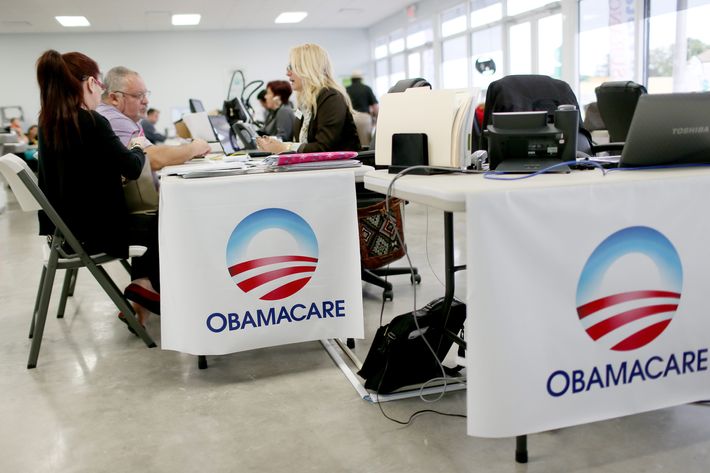Before Trump Tries to Kill It, Obamacare Actually Just Got a Lot Stronger

A month ago, there seemed to be at least some possibility that the doomsaying predictions that Obamacare opponents have made since the law passed might finally come true. Premiums on the individual-exchange markets, which initially came in well below projected levels when the exchanges opened in 2014, spiked this fall by some 25 percent. While the price hike only brought premium levels back up to their initially projected levels, it seemed at least conceivable that the spike would set off a death spiral. If the higher premiums drove customers out of the exchanges, a shrinking pool could lead to higher rates, more customers leaving, and ultimately trigger a wholesale collapse.
The libertarian columnist Megan McArdle, who has been predicting the law’s imminent collapse since before it even came into existence, wrote a relatively balanced and honest column on November 3 laying out the two possibilities for the marketplace. “Are rates going up because insurers mispriced their insurance? Or are they going up because these markets are too unstable for insurers to make money at any price?” McArdle conceded it was possible that a “one-time pricing error” and a correction would leave the markets healthy. Her column landed on the other, more tantalizing possibility: that the markets would enter a death spiral. “No one knows,” she conceded.
But in the wake of the election and the holidays, when few people have paid attention, we have important news that makes the death-spiral scenario look extremely remote. First, sign-ups in the exchanges did not shrink. They actually set a new record, with 6.4 million sign-ups, exceeding the previous year’s total by 400,000. Second, a new S&P report concludes that the 2016 premium increases were, indeed, a “one-time pricing correction.” Insurers presented with a brand-new market initially set their rates far too low, and now they have found a sustainable price point that consumers are willing to pay. Going forward, the report projects that insurers “will likely see continued improvement … with more insurers getting close to breakeven or better.”
Premium rates and overall market health differ a lot from state to state — the markets are doing much better in states that are trying to make them work, like California, than in states that are trying to sabotage them, like Texas. But on the whole, the exchanges are stable, and the predictions of the law’s critics have mostly failed.
Right-wing critics have greeted this evidence the same way they have met all other news that the law is mostly achieving its goals: by ignoring it completely. “Insurance markets are collapsing,” insists Paul Ryan. McArdle’s column today casually states that if Republicans do nothing, the individual market will go “flaming into a tailspin.” Note the progression of her argument. A few weeks ago, she had conceded that “flaming into a tailspin” was merely one possibility. In the meantime, there has emerged very strong evidence that this possibility is not occurring. But instead of adjusting her argument to the news that this scenario is, at best, much less likely, she is now treating it as a certainty.
Obamacare’s continued non-demise is terrible news for the Republican party. The GOP base, fed on years of slanted news depicting the law as an unmitigated disaster, expects it to be repealed quickly. If the law was collapsing on its own, it might be easier for Republicans to kill it off, or simply to let it die, without a political backlash. But the existence of a stable, and indeed growing, constituency means that their agenda will create numerous victims. As Sarah Kliff’s close reporting in Kentucky found, many Obamacare beneficiaries voted for Trump either because they believed his promises to give them “something terrific” that would cover all their medical expenses, or they disbelieved his promises to repeal the law that they now depend on. They now face the reality that the Republican agenda will inflict serious harm on their own constituents.
If Republicans truly believed Obamacare was collapsing on its own, or that nobody liked the benefits it provides, they would either let the law die of its own accord or wait to replace it with an alternative of their own design. They won’t do either because they are coming face-to-face with the gap between their own delusions and stubborn reality






